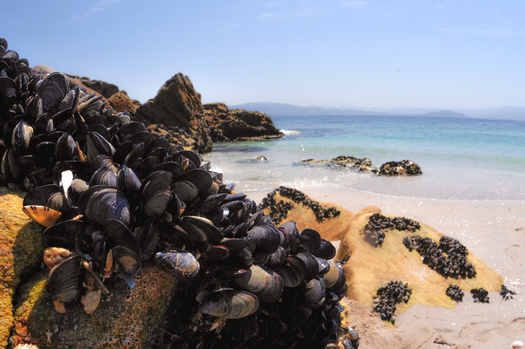
A 2017 Purdue University research project found a more earth-friendly adhesive was created by sea mussels. They extend hair-like fibers that attach to surfaces using plaques of adhesive. (Adobe Stock)
Scientists at Purdue University have been experimenting to create adhesives designed to be easier on the environment.
So many products from cellphones and shoes, to furniture and cars all contain adhesives. And because of their petroleum base, there are downsides, as the adhesives may have a strong odor and not be biodegradable when they end up in landfills.
Jonathan Wilker, professor of chemistry at Purdue University, along with his team of chemists found a safer alternative by studying oysters and mussels.
"We take the information we learned from the animals and we create 'biomimetic' adhesives, we call them," Wilker explained. "Surface adhesives that are modeled after biological systems."
Wilker noted like adhesives, sea animals stick to coastal rocks to build their communities. His lab team wanted to make a product just as strong, but also affordable, nontoxic, and sustainably sourced. Wilker's team also had to consider the availability or scale of the materials they started with at the onset of testing.
Research indicates most wood adhesives using petroleum-derived products contain formaldehyde resin. Formaldehyde is already strongly regulated, and more restrictions could be coming in the European market.
Instead, Wilker's formula uses soy oil, mixed with malic acid, a compound which gives apples their tart flavor. He pointed out they have tested it successfully on wood, plastics and metals. Wilker added he is happy to see the interest generated since the findings were published in the journal "Nature," and would like to see more.
"We're looking for partners to help commercialize the technology and actually have an environmental impact," Wilker stressed. "(The) ideal timeline is now; there's no reason to wait. We think we've got it to the point that it's ready to go out."
Future plans for the adhesive are to do further research for possible use in the medical field, as well as for industrial materials and packaging.
Terri Dee, Anchor/Producer
Monday, September 25, 2023
